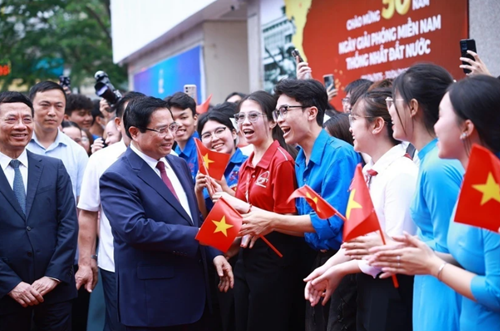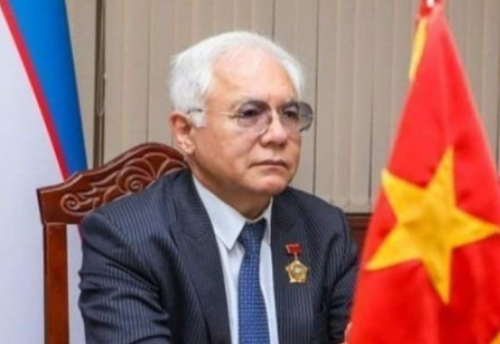He described the victory in 1975 as a symbol of hope for peace, independence, and progress, inspiring other nations across the globe. Moreover, Vietnam’s post-1975 development has become a model of success, showcasing the skillful leadership of its Communist Party, its self-reliance and a flexible foreign policy.
    |
 |
|
Prime Minister Pham Minh Chinh and students at the launching ceremony of the national movement on innovation and digital transformation in Hanoi on April 24 |
Today, Vietnam is among the most dynamic developing countries, playing an active role in international organizations such as the United Nations, the Association of Southeast Asian Nations (ASEAN), the Asia-Europe Meeting (ASEM), and the Asia-Pacific Economic Cooperation (APEC).
On lessons drawn from the victory serving Vietnam’s development, Alisher highlighted the policy of national solidarity. He expressed particular admiration for the Party and State’s consistent emphasis on ethnic and religious harmony, citing the nationwide celebrations of its national great solidarity day as a vivid testament. Vietnam’s constitution guarantees the rights of all citizens regardless of race, nationality, gender, social status, or public order.
    |
 |
|
Dr Alisher Mukhamedov, Chairman of the Uzbekistan-Vietnam Friendship Association |
He also commended Vietnam’s continued diplomatic prowess. During the resistance wars, the nation successfully garnered international support for its just cause, maintaining a close integration of diplomacy with military and political strategy. Half a century later, diplomacy remains central to safeguarding national sovereignty, promoting peace, expanding the country’s development space, and strengthening equal, mutually beneficial relations with international partners.
He further praised Vietnam’s consistent implementation of its "Four No's" defense policy: no military alliances, no siding with one country against another, no foreign military bases or use of the Vietnamese territory to oppose other countries, and no use of force or threat to use force in international relations. This approach has helped Vietnam avoid military conflict and maintain a stable, peaceful environment conducive to economic growth, the official assessed.
He said fifty years on, Vietnam’s transformation has been nothing short of spectacular. The economic and political reforms initiated in 1986 under the Doi Moi (Renewal) program served as a catalyst for rapid economic growth.
Alisher stressed that the country’s balanced domestic and foreign policies have made it one of the safest destinations in Asia-Pacific – a crucial consideration for multinational corporations when choosing locations for factories and operations. Vietnam’s strategic geographic position in Southeast Asia, close to major maritime trade routes, and its well-developed export infrastructure were also cited as major advantages.
Looking ahead, he noted that while Vietnam has achieved remarkable success, sustainable development will require a stronger focus on human resources development, particularly in cultivating a highly skilled workforce proficient in science and technology – critical drivers of sustainable growth.
Source: VNA